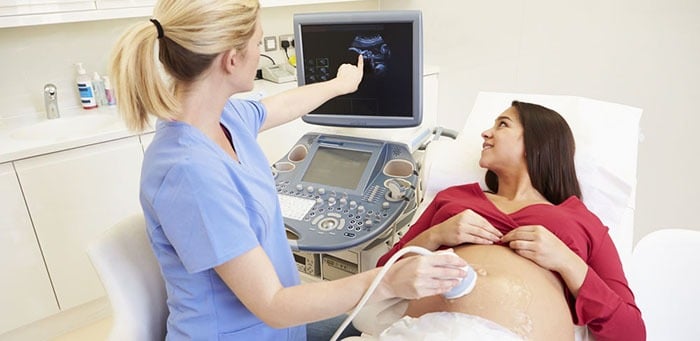Receiving a positive result on a pregnancy test can fill you with a mix of joy and anticipation. However, the follow-up ultrasound showing no visible baby can lead to confusion and worry. This guide will help you understand what might be happening and what steps to take next.
A positive pregnancy test detects the presence of the hormone hCG, which is produced during pregnancy. It's natural to expect this sign to be confirmed by an ultrasound. However, there are several reasons why the ultrasound might not show a baby, even if the pregnancy test was positive.
One common scenario is simply timing. Early in pregnancy, it might be too early for the ultrasound to detect the developing embryo. Medical professionals often recommend waiting for a follow-up ultrasound to give the pregnancy more time to develop. A study published in the Journal of Clinical Medicine notes that the timing of the first ultrasound is crucial in accurately diagnosing early pregnancy outcomes.
Ectopic pregnancies, where the embryo implants outside the uterus, can also lead to a positive pregnancy test without a baby visible in the uterine cavity. These are critical cases because they can be life-threatening if not treated promptly. The American Journal of Obstetrics and Gynecology reports that symptoms and diagnostic imaging are key to identifying ectopic pregnancies early.
Another possibility is an early miscarriage, which might occur before the first ultrasound. Research in the Journal of Pregnancy highlights that early miscarriages are unfortunately common and can be a cause of such confusing ultrasound results.
Lastly, a molar pregnancy, which is a rare complication where abnormal tissue grows inside the uterus, could also explain the positive test result. This type of pregnancy is detailed in a study from the Journal of Reproductive Medicine, explaining the growth of non-viable, cystic tissue instead of a normal pregnancy.
If you find yourself facing this puzzling situation, it's important to consult with your healthcare provider. They will likely recommend further testing, including repeat hCG levels and possibly a more detailed ultrasound, to understand the nature of your pregnancy.
While waiting for answers, it’s understandable to feel a range of emotions. Remember, medical professionals at clinics like International Ultrasound Services are here to support you through this uncertain time with expert care and compassion. Remember, not all pregnancies follow the same path, and early discrepancies in testing don’t necessarily spell negative outcomes.
Understanding the Basics
When you get a positive result on a pregnancy test, it indicates the presence of the hormone human chorionic gonadotropin (hCG) in your body, which is produced after a fertilized egg attaches to the uterine lining. This is usually a clear sign of pregnancy. However, sometimes, an early ultrasound might not show a baby. This can be puzzling and often worrying, but there are understandable reasons why this might happen.
Early Stages of Pregnancy
At the very start of pregnancy, it's possible that the embryo is too small to be seen or that the pregnancy has not progressed enough for ultrasound detection. An ultrasound performed too early might just be unable to visualize the tiny gestational sac or developing embryo.
What to Expect on an Ultrasound
Typically, by about five to six weeks of pregnancy, an ultrasound can usually detect a gestational sac. By the sixth week, it might also show a yolk sac or even the beginnings of a fetal pole. It's important to know these timelines because timing plays a critical role in what an ultrasound can reveal.
If your ultrasound shows no baby, your healthcare provider might suggest waiting a week or two and then repeating the test. This wait can often resolve the initial uncertainty as the pregnancy may just be at a very early stage.
Understanding these basic concepts can help manage expectations and reduce anxiety during the very early stages of pregnancy. Always consult with your healthcare provider to understand your specific situation better and to receive advice tailored to your health needs.

Possible Reasons for the Discrepancy
When you have a positive pregnancy test but no baby appears on the ultrasound, several medical explanations can account for this situation. Understanding these reasons can help manage expectations and guide next steps.
Very Early Pregnancy
One of the simplest explanations is that it might be too early in the pregnancy to see the baby on an ultrasound. Ultrasounds might not show a visible embryo or heartbeat until around the fifth or sixth week of pregnancy. A study published in the American Journal of Obstetrics and Gynecology notes that ultrasounds performed before the fifth week often do not show clear indications of pregnancy due to the small size of the embryo.
Ectopic Pregnancy
An ectopic pregnancy, where the embryo implants outside the uterus, often does not show up in a routine ultrasound scan of the uterus. This type of pregnancy can be dangerous and requires immediate medical attention. The Journal of Emergency Medicine has documented that ectopic pregnancies account for approximately 2% of all pregnancies but are the leading cause of first-trimester maternal death.
Miscarriage
Early miscarriage could also explain a positive pregnancy test followed by an absence of a visible baby on the ultrasound. Miscarriages are unfortunately common in the first trimester, with the British Journal of Obstetrics and Gynaecology reporting that up to 15% of confirmed pregnancies end in miscarriage, often before the pregnancy is clinically recognized.
Molar Pregnancy
Another possible reason could be a molar pregnancy, a rare complication characterized by abnormal growths in the womb instead of a healthy baby. Molar pregnancies can produce high levels of hCG, the pregnancy hormone detected by pregnancy tests, but result in no viable pregnancy. The New England Journal of Medicine discusses how molar pregnancies are detected primarily through ultrasounds and hCG level measurements, which differentiate them from normal pregnancies and other complications like ectopic pregnancies.
Each of these situations shows how critical it is to follow up with healthcare providers for further testing and appropriate care. They can provide the necessary guidance and support to understand and address the underlying reasons for these medical discrepancies.
Diagnostic Steps and Medical Evaluation
When you get a positive pregnancy test but no baby appears on the ultrasound, it's crucial to take a structured approach to understand what’s happening. Here's what to expect in terms of further diagnostics and medical evaluation:
Repeat hCG Testing
The first step is often repeating the human chorionic gonadotropin (hCG) test. These hormone levels are indicative of pregnancy and their progression can provide initial clues about the pregnancy's viability. Rising levels suggest an ongoing pregnancy, whereas declining levels might indicate a miscarriage or other complications.
Transvaginal Ultrasound
If the initial abdominal ultrasound shows no signs of a pregnancy, a transvaginal ultrasound may be recommended. This method provides a closer, more detailed view of the uterus and can help detect very early pregnancies or conditions that an abdominal ultrasound might miss.
Evaluation for Ectopic Pregnancy
It's important to rule out an ectopic pregnancy, where the embryo implants outside the uterus, often in a fallopian tube. This condition can be life-threatening if not treated promptly. Signs of an ectopic pregnancy can sometimes be detected through specialized ultrasounds and diagnostic tests.
Monitoring and Follow-up
Continued monitoring may be necessary if the initial results are inconclusive. This could involve additional ultrasounds or hCG tests spread over several days or weeks. This watchful waiting helps to track the development of the pregnancy and ensure any changes are noted quickly.
Consultation with a Specialist
In cases where the situation remains unclear, or if there are signs of complications, consultation with a specialist in early pregnancy issues might be necessary. These professionals can offer more advanced diagnostic techniques and treatments.
Through these steps, healthcare providers aim to offer a clear diagnosis and appropriate guidance for any next steps. It’s essential to follow your doctor’s recommendations closely and attend all follow-up appointments to ensure the best possible care.
Emotional and Psychological Impact
Receiving a positive pregnancy test can be a moment of joy and anticipation. Yet, when an ultrasound shows no baby, it often leads to confusion and distress. This unexpected scenario might leave you feeling a whirlwind of emotions—from disappointment to anxiety about the next steps.
It's common to feel a sense of loss or grief, even when the pregnancy was not advanced. A study published in the Journal of Psychosomatic Obstetrics & Gynecology highlights that early pregnancy uncertainties can significantly impact emotional well-being, suggesting that these feelings are a normal response to an abnormal situation.
Managing these emotions can be challenging. It is helpful to talk about your feelings with someone you trust—whether it's a partner, a friend, or a professional. Many find that discussing their experiences helps alleviate some of the emotional burden.
From a professional perspective, at International Ultrasound Services, we emphasize the importance of supportive consultations. Our sonographers are trained not only to provide clinical information but also to offer reassurance and understanding during what can be a perplexing time. Our goal is to ensure that you leave with a clear understanding of the possible medical scenarios and the next steps to take.
While the situation is undoubtedly hard, remember that you are not alone. Many have navigated this uncertainty, and support is available. Whether through follow-up medical care or counseling, taking steps to care for your emotional health is as important as attending to the physical aspects of this experience.
Case Studies
At International Ultrasound Services, we often encounter cases that challenge the usual expectations of early pregnancy. Understanding these scenarios can help alleviate concerns for those experiencing similar situations.
Case Study 1: The Early Timing
One common situation involves patients who test positive for pregnancy very early. A study published in the Journal of Clinical Medicine outlines that transvaginal ultrasounds may not detect a pregnancy until the hCG levels reach a specific threshold, typically around the time a menstrual period is missed. One of our patients, after testing positive, showed no signs of an embryo on the initial ultrasound. Following our protocol, we conducted a second ultrasound two weeks later, which successfully identified a healthy gestational sac.
Case Study 2: Ectopic Concerns
Ectopic pregnancies, where the embryo implants outside the uterus, represent another critical scenario. According to research from The Lancet, such pregnancies may not be initially visible on a routine pelvic ultrasound. We recall a patient whose initial scans showed no intrauterine pregnancy despite elevated hCG levels. Through vigilant monitoring and the use of targeted ultrasound techniques, we were able to diagnose an ectopic pregnancy early, allowing for timely medical intervention.
Case Study 3: Resolving Anomalies
Molar pregnancies are another condition that can cause confusion due to unusual ultrasound findings and disproportionately high hCG levels. A study featured in the American Journal of Obstetrics and Gynecology detailed the ultrasound characteristics of molar pregnancies, which we used to identify a case last year. The patient presented with a positive pregnancy test, but the ultrasound revealed a cluster of unusual cysts instead of a normal pregnancy. This prompt diagnosis enabled us to manage the patient's condition more effectively.
These cases from our clinic highlight the importance of expert evaluation and follow-up in the face of unusual early pregnancy results. Each scenario underscores the need for comprehensive care and the use of advanced ultrasound technology to ensure the best outcomes for our patients.
Conclusion
Experiencing a positive pregnancy test followed by an unclear ultrasound can be unsettling. It's crucial to know you're not alone and this situation is more common than you might think. Many times, the explanation is simply that the pregnancy is too early to be detected by ultrasound. In other instances, medical conditions such as ectopic pregnancies or early miscarriage might be the cause, which underscores the importance of timely follow-up with your healthcare provider.
At International Ultrasound Services, we handle numerous cases where initial ultrasounds do not reveal a visible pregnancy despite a positive test result. Through detailed follow-up assessments and compassionate care, we guide our patients to understand and manage their situation effectively. We recommend a repeat ultrasound or additional hCG level assessments to provide clearer answers.
Our team at IUS London is dedicated to providing you with the support and medical expertise you need during this confusing time. We are here to offer you the best care with the latest ultrasound technology and the most experienced professionals in the field. If you find yourself in this position, do not hesitate to reach out for the support and clarification you deserve.
Contacting International Ultrasound Services
For personal guidance and expert ultrasound services, consider contacting International Ultrasound Services in Notting Hill, London. Our experienced team can provide tailored advice and high-quality ultrasound scans to answer any questions you might have about your pregnancy status.
We understand that this time can be challenging, but you're not alone. High-quality information and support are available to help you through this uncertain time. For any further questions or to schedule a consultation, please visit our website or contact our office directly.
Content Information
We review all clinical content annually to ensure accuracy. If you notice any outdated information, please contact us at info@iuslondon.co.uk.
About the Author:

Yianni is a highly experienced sonographer with over 21 years in diagnostic imaging. He holds a Postgraduate Certificate in Medical Ultrasound from London South Bank University and is registered with the Health and Care Professions Council (HCPC: RA38415). Currently working at Barts Health NHS Trust, Yianni specialises in abdominal, gynaecological, and obstetric ultrasound. He is a member of the British Medical Ultrasound Society (BMUS), Society of Radiographers (SoR) and regularly contributes to sonographer and junior radiologists training programs.



